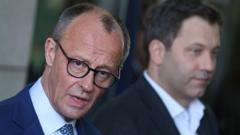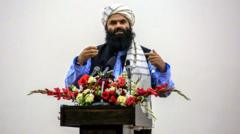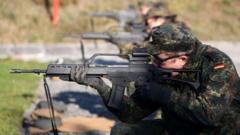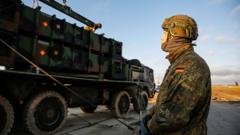As the country prepares for elections, the focus is shifting towards immigration policies and public safety after a suspected car-ramming incident in Munich.
**Migration and Violence Shape Germany’s Political Landscape Ahead of Elections**

**Migration and Violence Shape Germany’s Political Landscape Ahead of Elections**
In the wake of violent incidents tied to migrants, Germany's parliamentary elections are significantly influenced by the migration debate.
In Munich, a recent car-ramming attack has thrust the topic of migration into the spotlight just days ahead of Germany's parliamentary elections. The suspect, a 24-year-old Afghan asylum seeker named Farhad N., initially entered Germany seeking asylum in 2016, but his application was turned down. He was granted temporary permission to stay, highlighting the complexities of migrant absorption in Germany, especially in light of the upcoming vote.
This incident is not an isolated one, as several violent actions linked to immigrants have surfaced in the past year, causing political upheaval and fueling support for the far-right Alternative for Germany (AfD) party. Such escalation follows a series of violent incidents, including a tragic car attack at a Christmas market in Magdeburg last December that resulted in six deaths and over 299 injuries. The suspect then was a Saudi asylum seeker, stirring criticism toward the government’s migration policies.
The atmosphere further thickened after a stabbing in Aschaffenburg in January, where an Afghan asylum seeker attacked children at a park, killing a two-year-old and a passerby. Following these violent episodes, politicians from mainstream parties, especially conservatives, shifted their rhetoric, seeking to address rising public concerns regarding immigration and safety.
During a recent televised debate between Olaf Scholz, representing the centre-left Social Democratic Party (SPD), and his conservative competitor Friedrich Merz from the Christian Democrats (CDU), the issue of migration dominated the discussion. The focus pointed towards resolving irregular migration was met with criticism for painting migrants as inherently criminal. Both leaders, in a bid to diminish far-right popularity, adopted tougher stances on border policies, with Merz advocating for completely halting asylum admissions.
Critics highlight that such positions not only risk undermining European Union laws and potentially contradict the German constitution, they may also unintentionally lend legitimacy to far-right ideologies, thereby further entrenching the AfD’s narrative. Current polls suggest AfD's popularity sits above 20%, revealing that fears surrounding immigration have solidified their standing in German politics.
As Germany's elections draw near, the hope is to balance addressing the concerns of those affected by violence while navigating the contentious migration debate that continues to capture national attention. The outcome may redefine Germany's approach toward asylum policies for years to come.
This incident is not an isolated one, as several violent actions linked to immigrants have surfaced in the past year, causing political upheaval and fueling support for the far-right Alternative for Germany (AfD) party. Such escalation follows a series of violent incidents, including a tragic car attack at a Christmas market in Magdeburg last December that resulted in six deaths and over 299 injuries. The suspect then was a Saudi asylum seeker, stirring criticism toward the government’s migration policies.
The atmosphere further thickened after a stabbing in Aschaffenburg in January, where an Afghan asylum seeker attacked children at a park, killing a two-year-old and a passerby. Following these violent episodes, politicians from mainstream parties, especially conservatives, shifted their rhetoric, seeking to address rising public concerns regarding immigration and safety.
During a recent televised debate between Olaf Scholz, representing the centre-left Social Democratic Party (SPD), and his conservative competitor Friedrich Merz from the Christian Democrats (CDU), the issue of migration dominated the discussion. The focus pointed towards resolving irregular migration was met with criticism for painting migrants as inherently criminal. Both leaders, in a bid to diminish far-right popularity, adopted tougher stances on border policies, with Merz advocating for completely halting asylum admissions.
Critics highlight that such positions not only risk undermining European Union laws and potentially contradict the German constitution, they may also unintentionally lend legitimacy to far-right ideologies, thereby further entrenching the AfD’s narrative. Current polls suggest AfD's popularity sits above 20%, revealing that fears surrounding immigration have solidified their standing in German politics.
As Germany's elections draw near, the hope is to balance addressing the concerns of those affected by violence while navigating the contentious migration debate that continues to capture national attention. The outcome may redefine Germany's approach toward asylum policies for years to come.




















